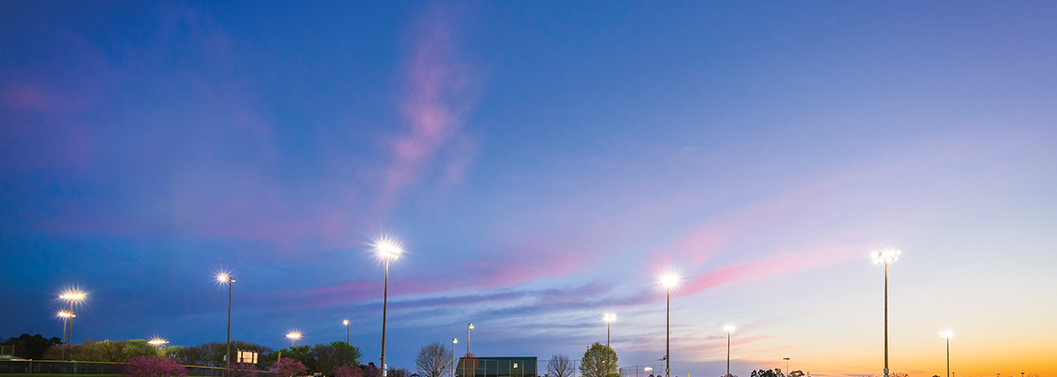PODCAST
NESFMA – Case Study: Challenges with Synthetic Pesticide and Fertilizer Bans
PODCAST: PLAY IN NEW WINDOW | DOWNLOAD
Podcast (podcast_associations): Play in new window | Download (Duration: 8:03 — 11.1MB) | Embed
Subscribe Email | TuneIn | RSS
NEW ENGLAND BLADE: Rick Perruzzi, CSFM, CPRP, City of South Portland, ME Parks and Recreation
INTRODUCTION
The South Portland, ME city council enacted a synthetic pesticide ban (in 2016) and fertilizer ban (in 2021) on public and private properties. Since 2016, changing our management approach to comply with the regulations, as well as researching and integrating alternative products for both pest management and fertility, has been difficult. Management of crabgrass and grubs has been particularly challenging. The restriction to using only organic fertilizers is also a considerable challenge, particularly in the spring and fall, which are the times of year with the most field usage and greatest need for recovery from wear, but when organic fertilizers are typically less effective due to cool soil temperatures.
SITE CONDITIONS
30 acres of sports fields; 150 total acres. Sandy loam, high organic content has led to an increase in thatch.
PROBLEM
• All our athletic fields are exposed to harsh environmental conditions (e.g., wind, surface water, and mechanical migration of weed seed). The site has no natural barriers surrounding the athletic fields. By September 2019, after three years without the option to use a pre-emergent herbicide, crabgrass populations were high enough to severely impact the playing surface quality of our athletic fields.
• We also faced significant fertility challenges, particularly in the spring and summer of 2022, when the region experienced a cool spring followed by severe drought.
• When soil temperatures are below 50 – 60ºF, turfgrass growth is limited and soil microbes are not active enough to break down organic products and release nutrients that the turfgrass can utilize.
• Even with an in-ground irrigation system in place, the lack of rainfall in summer affected the amount of available soil moisture in the soil profile. Subsequently, microbial activity and the breakdown of organic products was limited, resulting in poor turfgrass growth and suboptimal field conditions going into the busy fall season.
GOALS
• To better manage crabgrass and grub populations.
• To improve turfgrass recovery during periods of high usage, especially in cool weather, when organic fertilizer products are less effective due to the reduced soil microbial activity.
STEPS TAKEN
• On one athletic field that had excessive crabgrass populations, verticutting and mechanical removal were performed in two directions to clip crabgrass plants and encourage the perennial turfgrasses to compete. Even though there was significant removal of clippings, we were still concerned that the weed seed bank would affect field quality the following year. In 2019, we applied for and obtained a waiver to treat the fields in the spring of 2020 with a pre-emergent herbicide.
• The COVID shutdown provided the opportunity to be strategically more aggressive with aeration, overseeding, and topdressing practices (overseeding rates were 2 – 4 lbs./1000 ft. depending on existing turf density; aeration was performed on each field 1 – 2 times, using a combination of hollow and solid tines).
• Fertility requirements are different every year, as they are dictated by weather conditions. The warm spring and fall in 2020 produced ideal conditions to utilize organic products. However, the cool and damp conditions in the spring of 2022, followed by hot and dry conditions in the summer, were not suited to organic fertilizer products. Ground temperatures were not at the optimal range in the spring and the lack of moisture in summer prevented the microorganisms from breaking down the organic products so the turf could uptake nutrients. We obtained a waiver to apply a synthetic fertilizer on two of the 15 irrigated sports fields in fall 2022. This application provided a quick release of nutrients that was immediately available to the turfgrass and promoted a faster recovery from stress while relying solely on the irrigation system.
RESULTS
Crabgrass levels were reduced by the pre-emergent herbicide that was applied in spring 2020. The perennial turfgrasses were once again able to thrive with less competition from crabgrass plants. As of 2022, crabgrass levels are still under our threshold for reapplication for a pre-emergent herbicide waiver.
The fields that received a synthetic fertilizer application in 2022 rebounded nicely going into the fall season, performed at an acceptable level, and tolerated traffic from heavy play. The fields that received only an organic fertilizer were very slow to respond. They did respond once sufficient rainfall arrived mid-way through September. However, the rebound did not allow for adequate recuperation during the heavy fall play schedules.
WHAT WE LEARNED
The fields’ exposure to weed seed migration creates a difficult scenario for managing crabgrass. Aggressive overseeding and aeration has helped, but we expect that a waiver to apply a pre-emergent herbicide will be necessary every 3 – 4 years.
The fields that received a synthetic fertilizer application were healthier and better able to tolerate wear from the high traffic that the fields experienced.
CONCLUSION
Any turf management program is a work in progress that will evolve from year to year, whether traditional or non-traditional products are used. Restrictions on the use of certain products are a reality across the country. Getting ahead of these challenges is the most important task that a sports manager faces. Recordkeeping will play a pivotal role in how one approaches the hard conversations with policy-makers to ensure that athletic fields are safe and playable.

